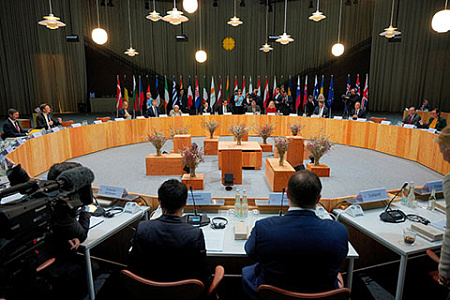
As European Union ministers convened in Copenhagen to discuss the integration paths of Ukraine, Moldova, and the Western Balkans, parallel diplomatic engagements by Russian President Vladimir Putin in China sent waves of apprehension through Brussels. The informal meeting, intended to gauge the progress of aspiring members, was overshadowed by what European officials perceived as troubling signals emanating from Moscow and its allies, complicating the bloc’s enlargement strategy.
Among the most perplexing developments was a statement from President Putin, who declared that Russia does not object to Ukraine’s potential membership in the European Union. This remark was met with deep suspicion rather than relief in Copenhagen. EU officials recall that Moscow’s fierce opposition to a Ukraine-EU association agreement in 2013 was a key catalyst for the crisis that followed. Putin’s apparent change of heart is seen as a calculated move to separate Ukraine’s economic integration from its NATO aspirations, which Russia considers a direct security threat.
The EU’s challenges were further underscored by Serbian President Aleksandar Vučić, who met with Putin and reaffirmed his country’s commitment to Russia. Despite being a leading candidate for EU accession, Vučić emphasized that Serbia would resist external pressure and remain the only country in Europe not to impose sanctions on Moscow. He also announced plans to deepen energy cooperation, a direct defiance of the EU’s policy to reduce reliance on Russian energy, raising serious questions in Brussels about Belgrade’s European trajectory.
Adding to the unease was a meeting between Putin and Slovak Prime Minister Robert Fico, held just before Fico’s scheduled visit to Ukraine. The discussion was viewed as a “bad signal” by some EU members, who fear Fico could act as a back-channel messenger for Putin to Ukrainian President Volodymyr Zelenskyy. Fico himself has focused his upcoming talks on ensuring the security of the Druzhba pipeline, which supplies his country with Russian gas, highlighting a potential crack in the EU’s united front.
Beyond these high-profile meetings, the EU’s expansion process faces numerous internal hurdles. Georgia was notably absent from the Copenhagen talks due to its democratic backsliding. Meanwhile, Hungary continues to block the start of formal accession negotiations with Ukraine, prompting Lithuania to suggest a procedure to bypass Budapest’s veto. Ultimately, however, a consensus is forming among EU leaders: the prospect of Ukraine’s full membership remains remote as long as the nation is engaged in active conflict, a scenario unprecedented in the history of EU enlargement.
